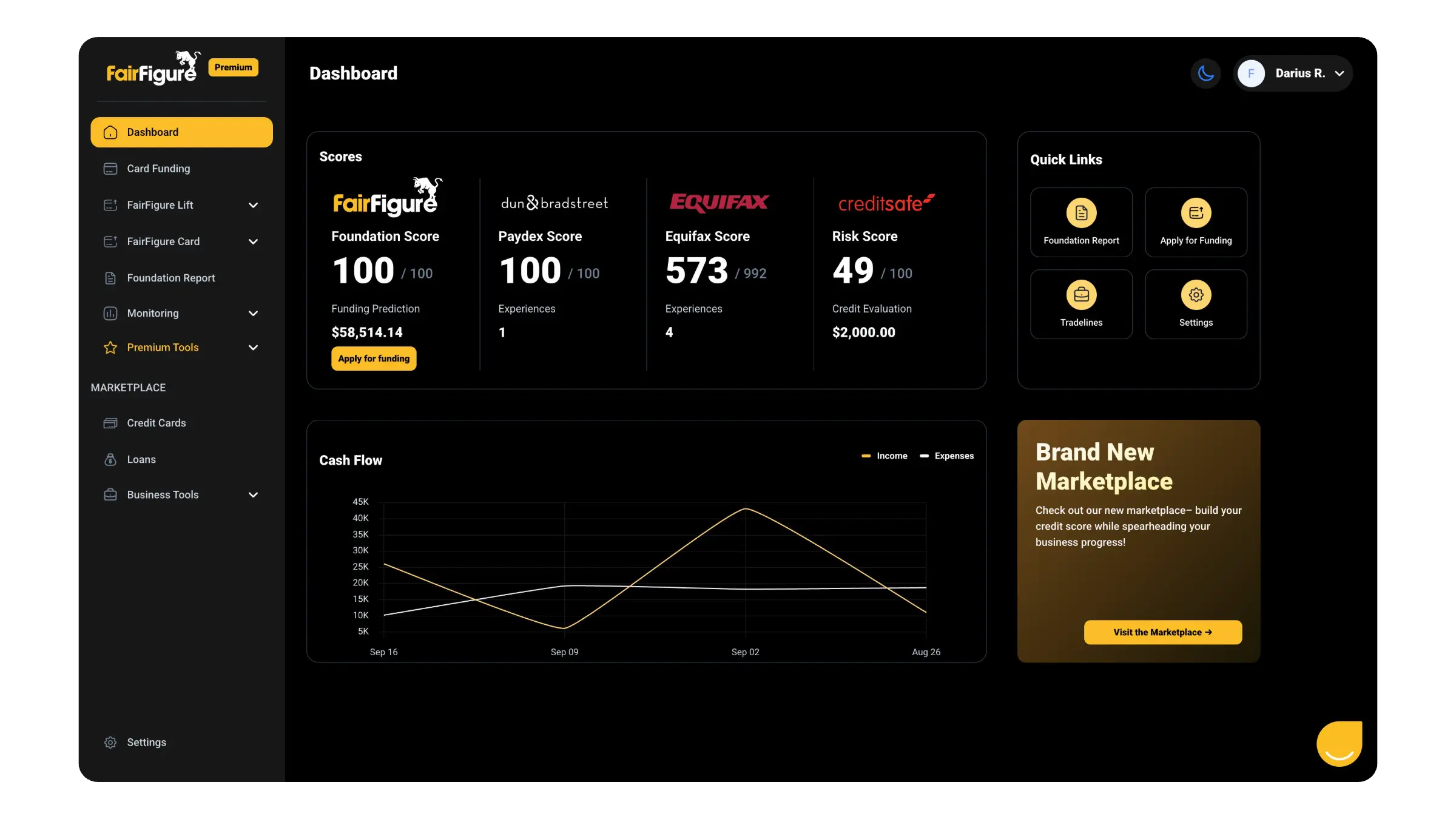What Secured Credit Card Builds Credit the Fastest?
Author: Nick Alex Gallo
January 23, 2026
8 min read
TABLE OF CONTENTS
- 1. The Credit Card Tier Theory
- 2. All Secured Credit Cards Report Payments
- 3. All Secured Credit Cards Report Balances
- 4. All Secured Credit Cards Report Credit Length
- 5. Look for Low Fees and Low Deposit Requirements
- 6. Personal Credit Considerations for Small Business Owners
- 7. Monitor Your Business Credit Scores With FairFigure

Start your credit building journey for your business

Since secured credit cards require collateral, they’re often accessible without a strong preexisting credit profile, making them an excellent option for building credit. However, some people contend that certain cards build credit faster than others. If you’re looking for a secured card, here’s what you should know about this theory and what other steps you can take to build good credit as efficiently as possible.
The Credit Card Tier Theory
There’s a popular theory that FICO scores go up faster or slower when you use secured credit cards from certain brands. Merrill Chandler, founder of Lexington Law, the Fundable Company, and CreditSense, is one of the leading proponents of this idea.
Chandler teaches that there are four distinct tiers of credit card providers. Tier one provides the most benefit to your score, and tier four provides the least, potentially even harming what he calls your “fundability.”
More specifically, if tier one provides 100% of the possible points a card can contribute to your credit score, tier two provides 80%, tier three provides 60%, and tier four provides just 40%. As a result, it’s in your best interest to emphasize tiers one and two.
Tier one providers include banks that are too big to fail, such as Citi, Bank of America, Chase, and Wells Fargo. Meanwhile, tier two includes the regional banks that cross state lines, like US Bank, Truist, and the California Bank and Trust.
Tier three refers to local credit unions and community banks, such as the Orange County Credit Union or First Liberty Bank. These might not contribute as strongly to your credit as tier one or two, but they can still be beneficial.
Last and least, there’s tier four, which refers to retail merchant credit issuers. These offer mall or online store cards, such as the Target Circle Credit Card or Victoria’s Secret Credit Card.
While using tier four cards responsibly could theoretically improve your credit score, any benefits would be greatly reduced.
In addition, the card could be a red flag to lenders if you were to ever apply for more serious types of funding, such as a business loan or line of credit.
All Secured Credit Cards Report Payments
Even if secured cards contribute to your credit score at different rates, their issuers all report your monthly payments to one or more of the major consumer credit bureaus, which include Equifax, Experian, and TransUnion.
Payment history is also the largest factor in your FICO score—weighted at 35% of the calculation—since lenders are primarily concerned with getting their money back.
As a result, even a single late payment can have a significant negative impact on your score and disrupt your credit-building efforts.
One of the most effective ways to avoid missing payments by accident is to enroll in automatic monthly payments. While it’s best to pay off your statement balance to avoid interest costs, making the minimum payment is enough to protect your score.
It can also be beneficial to set digital reminders in addition to autopay so you remember to pay off your desired balance manually, especially if your income varies from month to month.
Once your systems are set up, making consistent, timely payments on your secured credit card is the fastest way to improve your score. Generally, the more timely payments you make, the better your credit score will become.
All Secured Credit Cards Report Balances
In addition to your payment activities, secured credit card issuers always report your outstanding balance to the credit bureaus each month, as well as the total available credit on the account, which puts the debt amount in context.
This accounts for another 30% of your personal credit score, so it’s almost as impactful as your payment history. This reflects the idea that the more debt you accumulate, the more difficult it becomes for you to pay back everything you owe.
For the best results, it’s often recommended that you keep your credit card utilization rates between 1% and 10%, though others suggest you can allow it to reach as much as 30% before it starts to be detrimental.
To calculate your credit card utilization rate, simply divide your outstanding balance by your credit limit. For example, a card with a $5,000 balance and a $10,000 credit limit has a 50% credit utilization rate.
Keep in mind, this doesn’t mean you can’t purchase with your full credit line. It just means that on the account reporting date—when the issuer reports your details to the credit bureaus—you want your balance to be between 1% and 10%.
In the weeks between each billing cycle’s reporting date, there’s no harm in having a higher balance, as the amount won’t show up on your credit report.
All Secured Credit Cards Report Credit Length
Secured credit card issuers also report the length of time your account has been open to the credit bureaus. While this is less impactful to your credit score than factors like payment history and amounts owed, it’s still worth 15% of your rating.
As a result, it’s best to keep your card open indefinitely, especially if it’s the first account you’re using to build credit. FICO specifically considers the age of your oldest and newest tradelines, as well as the average age of all your accounts.
Generally, the longer your history, the better. This reflects the fact that the older your accounts, the more data you have to demonstrate your creditworthiness to lenders.
Fortunately, many secured credit cards allow you to convert to an unsecured line once you’ve proven yourself capable of responsible use. While the timeline depends on the provider and your usage, you can often make the switch after about six to twelve months.
Once you upgrade, the issuer should refund your security deposit but allow you to continue using the account. They may also offer you an increased credit limit.
Look for Low Fees and Low Deposit Requirements
Beyond the issuer tier, two of the most significant factors to consider when comparing potential secured card options are their annual fees and minimum deposit requirements.
There are plenty of good secured credit cards with a $0 annual fee, such as the Capital One Platinum Secured Card and the Discover It Secured Card. You don’t need to settle for one that charges you upwards of $50 per year just to maintain the credit account.
That said, minimum cash deposit requirements can be even more financially burdensome. Even though the amount is generally refundable, it can be difficult to come up with $1,000 in savings and lock the funds away for a year or more.
As a result, it’s often beneficial to aim for secured cards with relatively low minimum deposit requirements. For example, you can often find accounts you can qualify for with as little as $200 or $300 down.
While that can limit your potential credit line—since lenders often set credit limits equal to the amount of the deposit—that isn’t always the case. For example, the Capital One Platinum Secured Card offers $200 and up credit lines for deposits starting at $49.
Unfortunately, since secured cards are primarily for borrowers with low or no credit scores, their terms don’t tend to offer much in cash back rewards. For a more applicable way to pick a new account, consider choosing the product with the lower interest rate.
Personal Credit Considerations for Small Business Owners
If you’re a small business owner, having a personal credit score in good standing can help you get business financing you can use to grow your company. Many business credit lenders check your personal credit score as part of their due diligence.
This is especially common if you lack business credit history, apply for certain types of accounts (like business credit cards), or sign a personal guarantee, which makes you personally liable for your company’s debts.
However, building business credit is still necessary if you want to qualify for the most competitive types of financing, such as business loans or business lines of credit. If you’re trying to improve your business and personal scores simultaneously, it's often best to keep them separate. You don’t want to risk making a mistake in one realm that ends up damaging your creditworthiness in both.
For example, some business credit card issuers—including Capital One, Chase, and Discover—report negative information to the personal credit bureaus as well as the business ones.
Consider avoiding these when possible and sticking to business credit cards that report to the business credit bureaus only.
If you’re looking for good secured cards, you may be interested in our EIN only business credit card.
Alternatively, you can reference our articles on Secured Business Credit Cards That Report to D&B and Startup Business Credit Cards With No Credit EIN Only.
Monitor Your Business Credit Scores With FairFigure

FairFigure’s credit monitoring services help you recognize threats to your credit profile early and access both your personal and business credit reports and scores.
It also lets you build business credit with not just one, but two tradelines, including the Fairfigure Capital Card. Sign up with your EIN only—no personal credit check required.
More articles
Read More >
January 23, 2026
5 min read

January 23, 2026
5 min read

January 23, 2026
3 min read

Start your credit building journey for your business

Start your credit journey now with FairFigure